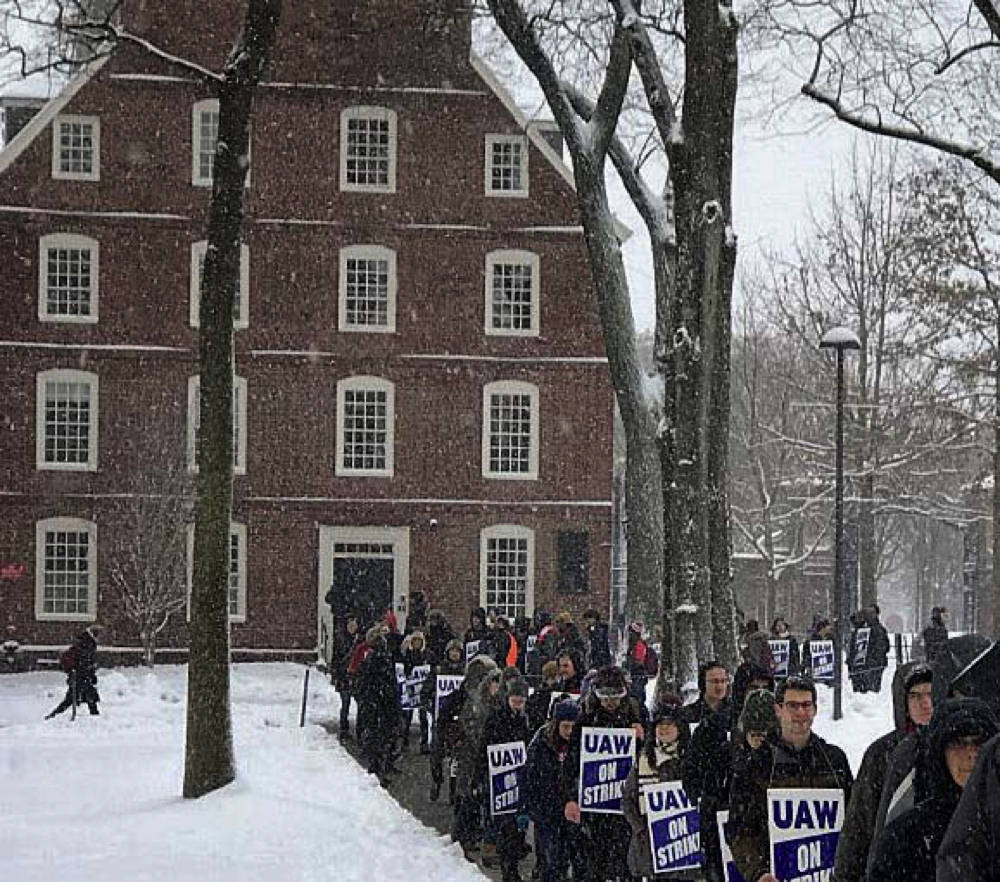Universities customarily are open places. There is security where required (dorms, labs, libraries and museums), but a visitor can get to most appointments without producing identification or passing through checkpoints. This porosity corresponds to the institutions’ openness: to discourse, the exchange of ideas, and the serendipitous meetings that pull back the curtains to discovery. Places like Harvard, in fact, spend a great deal of money arranging themselves to facilitate all that.
So it was jarring, during the already dark, cold examination period last December, to find the door to Massachusetts Hall locked and guarded, without and within. Ditto for the locked doors at University Hall, where the Faculty of Arts and Sciences (FAS) is quartered.

Graduate Union on strike
Photograph by Harvard Magazine/JS
The measures were understandable. The Graduate Student Union was loudly on strike. Student divestment protesters had been willing to disrupt routines to underscore their case. And student proponents of an ethnic-studies department, and of an associate professor in the field who was not granted tenure, had sat in at University Hall and infiltrated a faculty meeting—a serious breach of campus norms. Academic leaders are no more eager than other executives to have their offices occupied, as has happened in the past. Hence the precautions: low-key perhaps, but they made the campus chillier.
It would be tragic, even fatal, for Harvard if those doors closed permanently, along with the ears and minds of the community members whose work together is, after all, the institution’s reason for being—and the source of its international standing.
It is not news that the national discourse is highly polarized: more ranting than reasoning. Universities’ role is the antithesis: taking on the hardest questions, in their full complexity, and finding ways forward. Most of that work is far removed from the cacophony of the political marketplace: sifting new evidence to decipher an ancient text, understanding how plants transport water or diseases infiltrate humans. Other scholarship can be more fraught: on ways to organize an economy and distribute its fruits, say, or limit the carnage associated with guns (David Hemenway’s “Doing Less Harm,” January-February, page 43). But that work, too, can and does progress civilly.
Of immediate concern is the sense that the ratio of noise to signal—position-taking, rather than listening and engaging; persuading; and being persuaded—is on the rise on issues internal to the University. To cite a few:
• The Graduate Student Union’s strike was motivated, in part, by some members’ strong feeling that the University has failed to deal effectively with intolerable cases of sexual harassment and assault—a particular horror for students who depend on their faculty mentors’ support. They sought a separate dispute-resolution process, outside Harvard’s Title IX system. The University insisted that it is legally mandated to handle such matters as it does, and that undergraduate and graduate students within the union are, indisputably, covered by that mechanism. During months of negotiation, neither side seemed able to advance more effective ways of preventing harassment and assault—surely the most desirable outcome, compared to varying responses to devastating behavior post facto.
• The protests about ethnic studies resulted in loud student demands for disclosing within 24 to 48 hours the evidence brought to bear on the tenure decision. That won’t happen: tenure dossiers and proceedings are confidential. At the beginning of the fall semester, FAS dean Claudine Gay had unveiled a plan for multiple faculty appointments in ethnic studies. But that did not mollify students and professors angry about the denial of tenure—to the extent that, during FAS’s December meeting, faculty members abetted the startling violation of longstanding rules concerning attendance and conduct. (Thereafter, Gay reiterated her commitment to the appointments, supporting a concentration if professors develop one, and spending the time and resources necessary to build the field at Harvard.)
• And of course, the longest-running fissure, divestment, which has sparked debate and protests for several years. This administration is meeting more often, with more proponents, than its predecessor, but the terms have not shifted. Student, faculty, and alumni advocates insist the endowment must not contain assets related to further fossil-fuel production, and on February 4 the FAS called on the Corporation to alter its investment policies (read about the debate and vote at harvardmag.com/fas-divestdebate-feb-20). The administration and the Corporation are unlikely to be moved. No one is feeling better about the debate so far—quite the contrary—and no real evidence has yet emerged that the University might make a concerted commitment to research, education, and policy analysis on climate change: the realms in which it can excel.
By training, experience, and temperament, President Lawrence S. Bacow is inclined to find ways for people to work together, in furtherance of Harvard’s mission: pursuing scholarship to discover truths, and teaching. The headline controversies on campus during the past semester were structured so rigidly that navigating toward common ground, or even finding instances where people were actually debating points of view, rather than simply position-taking, seemed impossible. Objectively, from a distance perhaps, that is not the case. But the perception that Harvard attends to its own business the way the larger society now conducts its political life is discouraging. And the longer members of the community lock themselves into such fighting stances, the longer this privileged, special place risks focusing its energies inwardly, further alienating—and failing to assist—the impatient society beyond.
In his pre-winter recess letter to students, Harvard College dean Rakesh Khurana saluted them for speaking up “about the causes that you care about.” He also made a plea: “[S]ometimes we talk past each other instead of with each other.…I hope we can resolve to listen to each other and seek to understand the experiences that inform other people’s perspectives.”
Doing so undergirds the case for having a Harvard, entrusting it with enormous resources, and expecting the world to value the results. Is anyone listening?
~ John S. Rosenberg, Editor








